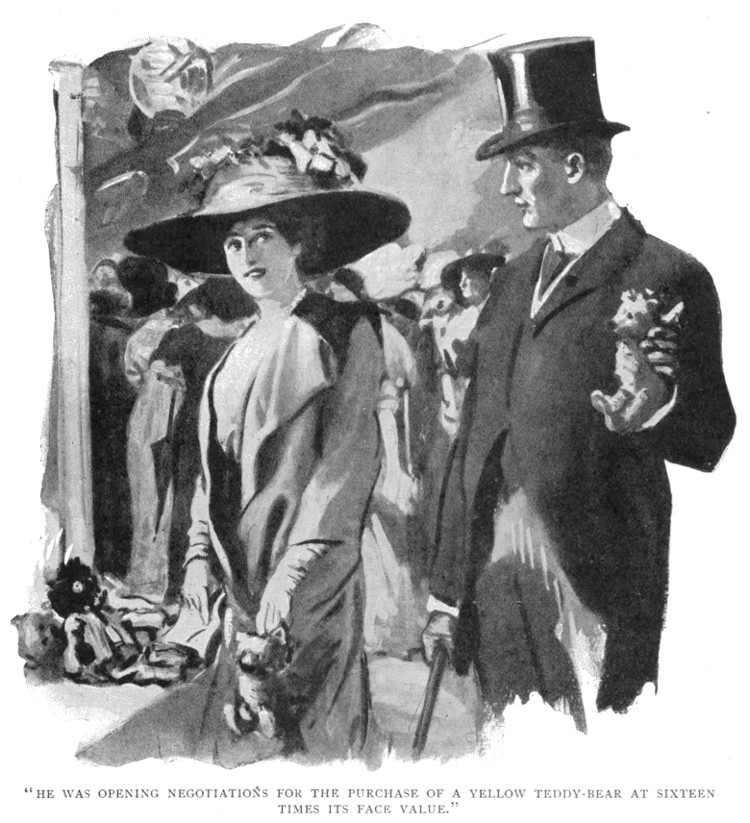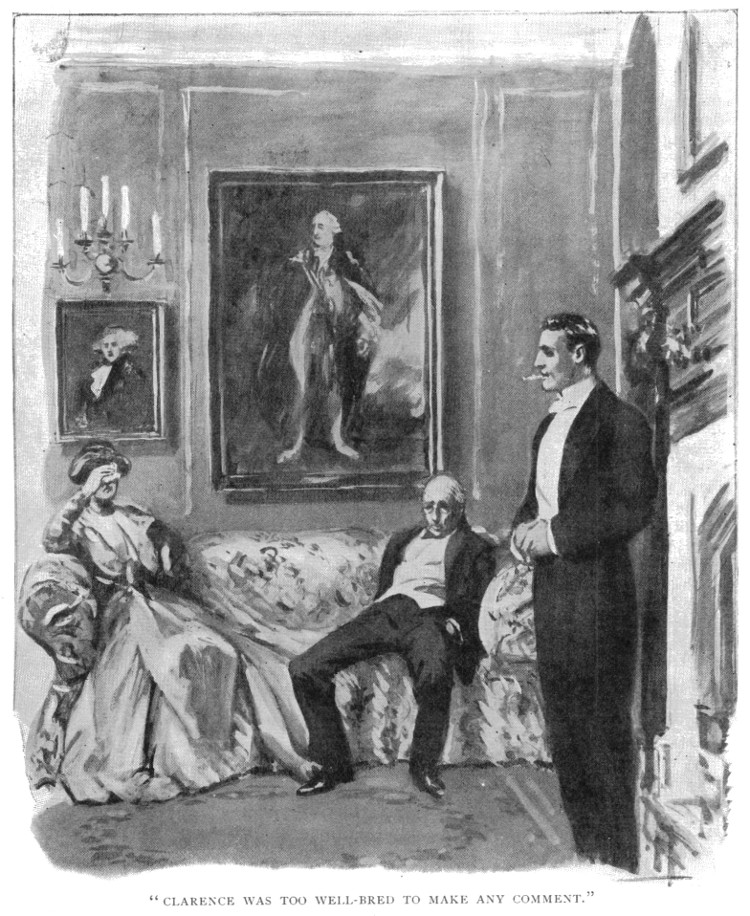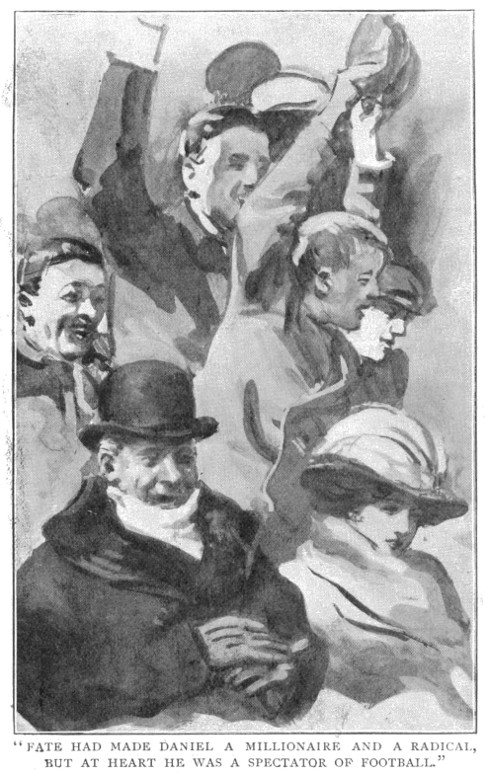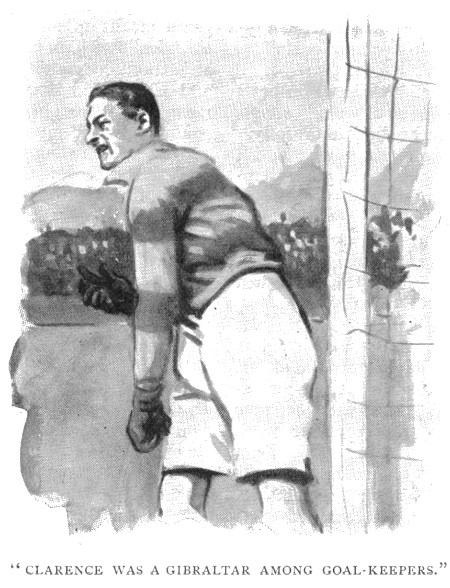
The Strand Magazine, January 1912
 HE main
difficulty in writing a story is to convey to the reader clearly yet tersely
the natures and dispositions of one’s leading characters. Brevity, brevity—that
is the cry. Perhaps, after all, the play-bill style is the best. In this drama
of love, football (Association code), and politics, then, the principals are as
follows, in their order of entry:—
HE main
difficulty in writing a story is to convey to the reader clearly yet tersely
the natures and dispositions of one’s leading characters. Brevity, brevity—that
is the cry. Perhaps, after all, the play-bill style is the best. In this drama
of love, football (Association code), and politics, then, the principals are as
follows, in their order of entry:—
Isabel Rackstraw (an angel).
The Hon. Clarence Tresillian (a Greek god).
Lady Runnymede (a proud old aristocrat).
Mr. Rackstraw (a multi-millionaire City man and Radical politician).
More about Clarence later. For the moment let him go as a Greek god. There were other sides, too, to Mr. Rackstraw’s character, but for the moment let him go as a multi-millionaire City man and Radical politician. Not that it is satisfactory; it is too mild. The Radical politics of other Radical politicians were as skim-milk to the Radical politics of Radical Politician Rackstraw. Where Mr. Lloyd George referred to the House of Lords as blithering backwoodsmen and asinine anachronisms, Mr. Rackstraw scorned to be so guarded in his speech. He did not mince his words. His attitude towards a member of the peerage was that of the terrier to the perambulating cat.
It was at a charity bazaar that Isabel and Clarence first met. Isabel was presiding over the Billiken, Teddy-bear, and Fancy Goods stall. There she stood, that slim, radiant girl, buncoing Ardent Youth out of its father’s hard-earned with a smile that alone was nearly worth the money, when she observed, approaching, the handsomest man she had ever seen. It was—this is not one of those mystery stories—it was Clarence Tresillian. Over the heads of the bevy of gilded youths who clustered round the stall their eyes met. A thrill ran through Isabel. She dropped her eyes. The next moment Clarence had made his spring; the gilded youths had shredded away like a mist, and he was leaning towards her, opening negotiations for the purchase of a yellow Teddy-bear at sixteen times its face value.

He returned at intervals during the afternoon. Over the second Teddy-bear they became friendly, over the third intimate. He proposed as she was wrapping up the fourth golliwog, and she gave him her heart and the parcel simultaneously. At six o’clock, carrying four Teddy-bears, seven photograph frames, five golliwogs, and a billiken, Clarence went home to tell the news to his parents.
Clarence, when not at the University, lived with his father and mother in Belgrave Square. His mother had been a Miss Trotter, of Chicago, and it was on her dowry that the Runnymedes contrived to make both ends meet. For a noble family they were in somewhat straitened circumstances financially. They lived, simply and without envy of their rich fellow-citizens, on their hundred thousand pounds a year. They asked no more. It enabled them to entertain on a modest scale. Clarence had been able to go to Oxford; his elder brother, Lord Staines, into the Guards. The girls could buy an occasional new frock. On the whole, they were a thoroughly happy, contented English family of the best sort. Mr. Trotter, it is true, was something of a drawback. He was a rugged old tainted millionaire of the old school, with a fondness for shirt-sleeves and a tendency to give undue publicity to tooth-picks. But he had been made to understand at an early date that the dead-line for him was the farther shore of the Atlantic Ocean, and he now gave little trouble.

Having dressed for dinner, Clarence proceeded to the library, where he found his mother in hysterics and his father in a state of collapse on the sofa. Clarence was too well-bred to make any comment. A true Runnymede, he affected to notice nothing, and, picking up the evening paper, began to read. The announcement of his engagement could be postponed to a more suitable time.
“Clarence!” whispered a voice from the sofa.
“Yes, father?”
The silver-haired old man gasped for utterance.
“I’ve lost my little veto,” he said, brokenly, at length.
“Where did you see it last?” asked Clarence, ever practical.
“It’s that fellow Rackstraw!” cried the old man, in feeble rage. “That bounder Rackstraw! He’s the man behind it all. The robber!”
“Clarence!”
It was his mother who spoke. Her voice seemed to rip the air into a million shreds and stamp on them. There are few things more terrible than a Chicago voice raised in excitement or anguish.
“Mother!”
“Never mind your pop and his old veto. He didn’t know he had one till the paper said he’d lost it. You listen to me. Clarence, we are ruined.”
Clarence looked at her inquiringly.
“Ruined much?” he asked.
“Bed-rock,” said his mother. “If we have sixty thousand dollars a year after this, it’s all we shall have.”
A low howl escaped from the stricken old man on the sofa.
Clarence betrayed no emotion.
“Ah,” he said, calmly. “How did it happen?”
“I’ve just had a cable from Chicago, from your grand-pop. He’s been trying to corner wheat. He always was an impulsive old gazook.”
“But surely,” said Clarence, a dim recollection of something he had heard or read somewhere coming to him, “isn’t cornering wheat a rather profitable process?”
“Sure,” said his mother. “Sure it is. I guess dad’s try at cornering wheat was about the most profitable thing that ever happened—to the other fellows. It seems like they got busy and clubbed fifty-seven varieties of Hades out of your old grand-pop. He’s got to give up a lot of his expensive habits, and one of them is sending money to us. That’s how it is.”
“And on top of that, mind you,” moaned Lord Runnymede, “I lose my little veto. It’s bitter—bitter.”
Clarence lit a cigarette and drew at it thoughtfully. “I don’t see how we’re going to manage on twelve thousand quid a year,” he said.
His mother crisply revised his pronouns.
“We aren’t,” she said. “You’ve got to get out and hustle.”
Clarence looked at her blankly.
“Me?”
“You.”
“Work?”
“Work.”
Clarence drew a deep breath.
“Work? Well, of course, mind you, fellows do work,” he went on, thoughtfully. “I was lunching with a man at the Bachelors’ only yesterday who swore he knew a fellow who had met a man whose cousin worked. But I don’t see what I could do, don’t you know.”
His father raised himself on the sofa.
“Haven’t I given you the education of an English gentleman?”
“That’s the difficulty,” said Clarence.
“Can’t you do anything?” asked his mother.
“Well, I can play footer. By Jove, I’ll sign on as a pro. I’ll take a new name. I’ll call myself Jones. I can get signed on in a minute. Any club will jump at me.”
This was no idle boast. Since early childhood Clarence had concentrated his energies on becoming a footballer, and was now an exceedingly fine goal-keeper. It was a pleasing sight to see him, poised on one foot in the attitude of a Salomé dancer, with one eye on the man with the ball, the other gazing coldly on the rest of the opposition forward-line, uncurl abruptly like the main-spring of a watch and stop a hot one. Clarence in goal was the nearest approach to an indiarubber acrobat and society contortionist to be seen off the music-hall stage. He was, in brief, hot stuff. He had the goods.
Scarcely had he uttered these momentous words when the butler entered with the announcement that he was wanted by a lady on the telephone.
It was Isabel, disturbed and tearful.
“Oh, Clarence,” she cried, “my precious angel wonder-child, I don’t know how to begin.”
“Begin just like that,” said Clarence, approvingly. “It’s topping. You can’t beat it.”
“Clarence, a terrible thing has happened. I told papa of our engagement, and he wouldn’t hear of it. He c-called you a a p-p-p——”
“A what?”
“A pr-pr-pr——”
“He’s wrong. I’m nothing of the sort. He must be thinking of someone else.”
“A preposterous excrescence on the social cosmos. He doesn’t like your father being an earl.”
“A man may be an earl and still a gentleman,” said Clarence, not without a touch of coldness in his voice.
“I forgot to tell him that. But I don’t think it would make any difference. He says I shall only marry a man who works.”
“I am going to work, dearest,” said Clarence. “I am going to work like a horse. Something—I know not what—tells me I shall be rather good at work. And one day when I——”
“Good-bye,” said Isabel, hastily. “I hear papa coming.”
Clarence, as he had predicted, found no difficulty in obtaining employment. He was signed on at once, under the name of Jones, by Houndsditch Wednesday, the premier metropolitan club, and embarked at once on his new career.
The season during which Clarence Tresillian kept goal for Houndsditch Wednesday is destined to live long in the memory of followers of professional football. Probably never in the history of the game has there been such persistent and widespread mortality among the more distant relatives of office-boys and junior clerks. Statisticians have estimated that if all the grandmothers alone who perished between the months of September and April that season could have been placed end to end, they would have reached from Hyde Park Corner to the outskirts of Manchester. And it was Clarence who was responsible for this holocaust. Previous to the opening of the season sceptics had shaken their heads over the Wednesday’s chances in the First League. Other clubs had bought up the best men in the market, leaving only a mixed assortment of inferior Scotsmen, Irishmen, and North-countrymen to uphold the honour of the London club.
And then, like a meteor, Clarence Tresillian had flashed upon the world of football. In the opening game he had behaved in the goal-mouth like a Chinese cracker, and exhibited an absolutely impassable defence; and from then onward, except for an occasional check, Houndsditch Wednesday had never looked back.
Among the spectators who flocked to the Houndsditch ground to watch Clarence perform there appeared week after week a little grey, dried-up man, insignificant except for a certain happy choice of language in moments of emotion and an enthusiasm far surpassing that of the ordinary spectator. To the trained eye there are subtle distinctions between football enthusiasts. This man belonged to the comparatively small class of those who have football on the cerebrum.
 Fate had made Daniel Rackstraw a
millionaire and a Radical, but at heart he was a spectator of football. He
never missed a match. His library of football literature was the finest in the
country. His football museum had but one equal, that of Mr. Jacob Dodson, of
Manchester. Between them the two had cornered, at enormous expense, the curio
market of the game. It was Rackstraw who had secured the authentic pair of
boots in which Bloomer had first played for England; but it was Dodson who
possessed the painted indiarubber ball used by Meredith when a boy—probably
the first thing except a nurse ever kicked by that talented foot. The two men
were friends, as far as rival connoisseurs can be friends; and Mr. Dodson, when
at leisure, would frequently pay a visit to Mr. Rackstraw’s country house,
where he would spend hours gazing wistfully at the Bloomer boots, buoyed up
only by the thought of the Meredith ball at home.
Fate had made Daniel Rackstraw a
millionaire and a Radical, but at heart he was a spectator of football. He
never missed a match. His library of football literature was the finest in the
country. His football museum had but one equal, that of Mr. Jacob Dodson, of
Manchester. Between them the two had cornered, at enormous expense, the curio
market of the game. It was Rackstraw who had secured the authentic pair of
boots in which Bloomer had first played for England; but it was Dodson who
possessed the painted indiarubber ball used by Meredith when a boy—probably
the first thing except a nurse ever kicked by that talented foot. The two men
were friends, as far as rival connoisseurs can be friends; and Mr. Dodson, when
at leisure, would frequently pay a visit to Mr. Rackstraw’s country house,
where he would spend hours gazing wistfully at the Bloomer boots, buoyed up
only by the thought of the Meredith ball at home.
Isabel saw little of Clarence during the winter months, except from a distance. She contented herself with clipping photographs of him from the sporting papers. Each was a little more unlike him than the last, and this lent variety to the collection. Her father marked her new-born enthusiasm for the game with approval. It had been secretly a great grief to the old gentleman that his only child did not know the difference between a linesman and an inside right, and, more, did not seem to care to know. He felt himself drawn closer to her. An understanding, as pleasant as it was new and strange, began to spring up between parent and child.
As for Clarence, how easy it would be to haul up one’s slacks to practically an unlimited extent on the subject of his emotions at this time. One can figure him, after the game is over and the gay throng has dispersed, creeping moodily—but what’s the use? Brevity—that is the cry. Brevity. Let us on.
 The months sped by; the Cup-ties began,
and soon it was evident that the Final must be fought out between Houndsditch
Wednesday and Mr. Jacob Dodson’s pet team, Manchester United. With each match
the Wednesday seemed to improve. Clarence was a Gibraltar among goal-keepers.
The months sped by; the Cup-ties began,
and soon it was evident that the Final must be fought out between Houndsditch
Wednesday and Mr. Jacob Dodson’s pet team, Manchester United. With each match
the Wednesday seemed to improve. Clarence was a Gibraltar among goal-keepers.
Those were delirious days for Daniel Rackstraw. Long before the fourth round his voice had dwindled to a husky whisper. Deep lines appeared on his forehead; for it is an awful thing for a football enthusiast to be compelled to applaud, in the very middle of the Cup-ties, purely by means of facial expression. In this time of affliction he found Isabel an ever-increasing comfort to him. Side by side they would sit, and the old man’s face would lose its drawn look, and light up, as her clear young soprano pealed out over the din, urging this player to shoot, that to kick some opponent in the face; or describing the referee in no uncertain terms as a reincarnation of the late Mr. Dick Turpin.
And now the day of the Final at the Crystal Palace approached, and all England was alert, confident of a record-breaking contest. But alas! How truly does Epictetus observe: “We know not what awaiteth us round the corner, and the hand that counteth its chickens ere they be hatched oft-times doth but step on the banana-skin.” The prophets who anticipated a struggle keener than any in football history were destined to be proved false.
It was not that their judgment of form was at fault. On the run of the season’s play Houndsditch Wednesday v. Manchester United should have been the two most evenly-matched teams in the history of the game. Forward, the latter held a slight superiority; but this was balanced by the inspired goal-keeping of Clarence Tresillian. Even the keenest supporters of either side were not confident. They argued at length, figuring out the odds with the aid of stubs of pencils and the backs of envelopes, but they were not confident. Out of all those frenzied millions two men alone had no doubts. Mr. Daniel Rackstraw said that he did not desire to be unfair to Manchester United. He wished it to be clearly understood that in their own class Manchester United might quite possibly show to considerable advantage. In some rural league, for instance, he did not deny that they might sweep all before them. But when it came to competing with Houndsditch Wednesday—here words failed Mr. Rackstraw.
Mr. Jacob Dodson, interviewed by the Manchester Weekly Football-Boot, stated that his decision, arrived at after a close and careful study of the work of both teams, was that Houndsditch Wednesday had rather less chance in the forthcoming tourney than a stuffed rat in the Battersea Dogs’ Home. It was his carefully-considered opinion that in a contest with the second eleven of a village Church Lads’ Brigade, Houndsditch Wednesday might, with an effort (conceding them that slice of luck which so often turns the tide of a game), scrape home. But when it was a question of meeting a team like Manchester United—here Mr. Dodson, shrugging his shoulders despairingly, sank back in his chair, and watchful secretaries brought him round with oxygen.
Throughout the whole country nothing but the approaching match was discussed. Wherever civilization reigned, and in portions of Liverpool, one question alone was on every lip: Who would win? Octogenarians mumbled it. Infants lisped it. Tired city men, trampled under foot in the rush for their tram, asked it of the ambulance attendants who carried them to the hospital.
And then, one bright, clear morning, when the birds sang and all Nature seemed fair and gay, Clarence Tresillian developed mumps.
London was in a ferment. I could have wished to go into details, to describe in crisp, burning sentences the panic that swept like a tornado through a million homes. A little encouragement, the slightest softening of the editorial austerity, and the thing would have been done. But no. Brevity. That was the cry. Brevity. Let us on.
Houndsditch Wednesday met Manchester United at the Crystal Palace, and for nearly two hours the sweat of agony trickled unceasingly down the corrugated foreheads of the patriots in the stands. The men from Manchester, freed from the fear of Clarence, smiled grim smiles and proceeded to pile up points. It was in vain that the Houndsditch backs and half-backs skimmed like swallows about the field. They could not keep the score down. From start to finish Houndsditch were a beaten side.
London during that black period was a desert. Gloom gripped the City. In distant Brixton red-eyed wives faced silently-scowling husbands at the evening meal, and the children were sent early to bed. Newsboys called the extras in a whisper.
Few took the tragedy more nearly to heart than Daniel Rackstraw. Leaving the ground with the air of a father mourning over some prodigal son, he encountered Mr. Jacob Dodson, of Manchester.
Now, Mr. Dodson was perhaps the slightest bit shy on the finer feelings. He should have respected the grief of a fallen foe. He should have abstained from exulting. But he was in too exhilarated a condition to be magnanimous. Sighting Mr. Rackstraw, he addressed himself joyously to the task of rubbing the thing in. Mr. Rackstraw listened in silent anguish.
“If we had had Jones——” he said at length.
“That’s what they all say,” whooped Mr. Dodson. “Jones! Who’s Jones?”
“If we had had Jones, we should have——” He paused. An idea had flashed upon his overwrought mind. “Dodson,” he said, “look here. Wait till Jones is well again, and let us play this thing off again for anything you like a side in my private park.”
Mr. Dodson reflected.
“You’re on,” he said. “What side bet? A million? Two million? Three?”
Mr. Rackstraw shook his head scornfully.
“A million? Who wants a million? I’ll put up my Bloomer boot against your Meredith ball. Does that go?”
“I should say it did,” said Mr. Dodson, joyfully. “I’ve been wanting that boot for years. It’s like finding it in one’s Christmas stocking.”
“Very well,” said Mr. Rackstraw. “Then let’s get it fixed up.”
Honestly, it is but a dog’s life, that of the short-story writer. I particularly wished at this point to introduce a description of Mr. Rackstraw’s country house and estate, featuring the private football ground with its fringe of noble trees. It would have served a double purpose, not only charming the lover of Nature, but acting as a fine stimulus to the youth of the country, showing them the sort of home they would be able to buy some day if they worked hard and saved their money. But no. You shall have three guesses as to what was the cry. You give it up? It was Brevity—brevity! Let us on.
The two teams arrived at Mr. Rackstraw’s house in time for lunch. Clarence, his features once more reduced to their customary finely-chiselled proportions, alighted from the automobile with a swelling heart. Presently he found an opportunity to slip away and meet Isabel.
I will pass lightly over the meeting of the two lovers. I will not describe the dewy softness of their eyes, the catching of their breath, their murmured endearments. I could, mind you. It is at just such descriptions that I am particularly happy. But I have grown discouraged. My spirit is broken. It is enough to say that Clarence had reached a level of emotional eloquence rarely met with among goal-keepers of the First League, when Isabel broke from him with a startled exclamation, and vanished; and, looking over his shoulder, Clarence observed Mr. Daniel Rackstraw moving toward him.
It was evident from the millionaire’s demeanour that he had seen nothing. The look on his face was anxious, but not wrathful. He sighted Clarence, and hurried up to him.
“Jones,” he said, “I’ve been looking for you. I want a word with you.”
“A thousand, if you wish it,” said Clarence, courteously.
“Now, look here,” said Mr. Rackstraw. “I want to explain to you just what this game means to me. Don’t run away with the idea I’ve had you fellows down to play an exhibition game just to keep me merry and bright. If Houndsditch wins to-day, it means that I shall be able to hold up my head again and look my fellow-man in the face, instead of crawling round on my stomach and feeling like a black-beetle under a steam-roller. Do you get that?”
“I do,” replied Clarence.
“And not only that,” went on the millionaire. “There’s more. I have put up my Bloomer boot against Mr. Dodson’s Meredith ball as a side bet. You understand what that means? It means that either you win or my life is soured for ever. See?”
“I have got you,” said Clarence.
“Good. Then what I wanted to say was this. To-day is your day for keeping goal as you’ve never kept goal before. Everything depends on you. With you keeping goal like mother used to make it, Houndsditch are safe. Otherwise they are completely in the bouillon. It’s one thing or the other. It’s all up to you. Win, and there’s four thousand pounds waiting for you above what you share with the others.”
Clarence waved his hand deprecatingly.
“Mr. Rackstraw,” he said, “keep your dross. I care nothing for money. All I ask of you,” proceeded Clarence, “is your consent to my engagement to your daughter.”
Mr. Rackstraw looked sharply at him.
“Repeat that,” he said. “I don’t think I quite got it.”
“All I ask is your consent to my engagement to your daughter.”
“Young man,” said Mr. Rackstraw, not without a touch of admiration, “I admire cheek. But there is a limit. That limit you have passed so far that you’d need to look for it with a telescope.”
“You refuse your consent?”
“I never said you weren’t a clever guesser.”
“Why?”
Mr. Rackstraw laughed. One of those nasty, sharp, metallic laughs that hit you like a bullet.
“How would you support my daughter?”
“I was thinking that you would help to some extent.”
“You were, were you?”
“I was.”
“Oh?”
Mr. Rackstraw emitted another of those laughs.
“Well,” he said, “it’s off. You can take that as coming from an authoritative source. No wedding-bells for you.”
Clarence drew himself up, fire flashing from his eyes and a bitter smile curving his expressive lips.
“And no Meredith ball for you!” he cried.
Mr. Rackstraw started as if some strong hand had plunged an auger into him.
“What!” he shouted.
Clarence shrugged his superbly-modelled shoulders in silence.
“Come, come,” said Mr. Rackstraw, “you wouldn’t let a little private difference like that influence you in a really important thing like this football match, would you?”
“I would.”
“You would practically blackmail the father of the girl you love?”
“Every time.”
“Her white-haired old father?”
“The colour of his hair would not affect me.”
“Nothing would move you?”
“Nothing.”
“Then, by George, you’re just the son-in-law I want. You shall marry Isabel; and I’ll take you into partnership in my business this very day. I’ve been looking for a good able-bodied bandit like you for years. You make Captain Kidd look like a preliminary three-round bout. My boy, we’ll be the greatest combination, you and I, that the City has ever seen. Shake hands.”
For a moment Clarence hesitated. Then his better nature prevailed, and he spoke.
“Mr. Rackstraw,” he said, “I cannot deceive you.”
“That won’t matter,” said the enthusiastic old man. “I bet you’ll be able to deceive everybody else. I see it in your eye. My boy, we’ll be the greatest——”
“My name is not Jones.”
“Nor is mine. What does that matter?”
“My name is Tresillian. The Hon. Tresillian. I am the younger son of the Earl of Runnymede. To a man of your political views——”
“Nonsense, nonsense,” said Mr. Rackstraw. “What are political views compared with the chance of getting a goal-keeper like you into the family? I remember Isabel saying something to me about you, but I didn’t know who you were then.”
“I am a preposterous excrescence on the social cosmos,” said Clarence, eyeing him doubtfully.
“Then I’ll be one too,” cried Mr. Rackstraw. “I own I’ve set my face against it hitherto, but circumstances alter cases. I’ll ring up the Prime Minister on the ’phone to-morrow, and buy a title myself.”
Clarence’s last scruple was removed. Silently he gripped the old man’s hand, outstretched to meet his.
Little remains to be said, but I am going to say it, if it snows. I am at my best in these tender scenes of idyllic domesticity.
Four years have passed. Once more we are in the Rackstraw home. A lady is coming down the stairs, leading by the hand her little son. It is Isabel. The years have dealt lightly with her. She is still the same stately, beautiful creature whom I would have described in detail long ago if I had been given half a chance. At the foot of the stairs the child stops and points at a small, round object in a glass case.
“Wah?” he says.
“That?” said Isabel. “That is the ball Mr. Meredith used to play with when he was a little boy.”
She looks at a door on the left of the hall, and puts a finger to her lip.
“Hush!” she says. “We must be quiet. Daddy and grandpa are busy in there cornering wheat.”
And softly mother and child go out into the sunlit garden.
 Madame Eulalie’s Rare Plums
Madame Eulalie’s Rare Plums